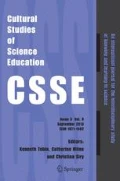Abstract
Over the years neoliberal ideology and discourse have become intricately connected to making science people. Science educators work within a complicated paradox where they are obligated to meet neoliberal demands that reinscribe dominant, hegemonic assumptions for producing a scientific workforce. Whether it is the discourse of school science, processes of being a scientist, or definitions of science particular subjects are made intelligible as others are made unintelligible. This paper resides within the messy entanglements of feminist poststructural and new materialist perspectives to provoke spaces where science educators might enact ethicopolitical hesitations. By turning to and living in theory, the un/making of certain kinds of science people reveals material effects and affects. Practicing ethicopolitical hesitations prompt science educators to consider beginning their work from ontological assumptions that begin with abundance rather than lack.

Figure adapted from Wallace (2017)
Similar content being viewed by others
References
Baldwin, J. (1998). A talk to teachers. In T. Morrison (Eds.) Library of America’s Collected Essays: New York.
Barad, K. (2007). Meeting the universe halfway: Quantum physics and the entanglement of matter and meaning. Durham, NC: Duke University Press.
Bazzul, J. (2012). Neoliberal ideology, global capitalism, and science education: Engaging the question of subjectivity. Cultural Studies of Science Education, 7(4), 1001–1020.
Bazzul, J., & Kayumova, S. (2016). Toward a social ontology for science education: Introducing Deleuze and Guattari’s assemblages. Educational Philosophy and Theory, 48(3), 284–299.
Bazzul, J., & Siry, C. (in-press). Critical voices in science education research: Narratives of academic journeys. New York: Springer.
Bazzul, J., Tolbert, S., & Kayumova, S. (in press). New materialisms and science classrooms: diagramming ontologies and critical assemblies. In K. Scantlebury & C. Milne, (Eds.), Material practice and materiality: too long ignored in science education. Netherlands: Springer.
Bencze, J. L., Carter, L., Chiu, M.-H., Duit, R., Matin, S., Siry, C., et al. (2012). Globalization and science education. COSMOS, 8(2), 139–152. https://doi.org/10.1142/S021960771250005X.
Biesta, G. J. J. (2010). Learner, student, speaker: Why it matters how we call those we teach. Educational Philosophy and Theory, 42(5–6), 540–552.
Biesta, G. J. J. (2012). Making sense of education: Fifteen contemporary educational theorists in their own words. New York: Springer.
Carter, L. (2014). The elephant in the room: Science education, neoliberalism, and resistance. In L. Bencze & S. Alsop (Eds.), Activist science and technology education (pp. 23–26). Dordrecht: Springer.
Deleuze, G., & Guattari, F. (1987). A thousand plateaus: Capitalism and schizophrenia. Minneapolis: University of Minnesota Press.
Freire, P. (1970). Pedagogy of the oppressed. New York: Bloomsbury Publishing.
Greene, M. (1995). Releasing the imagination: Essays on education, the arts, and social change. San Francisco: Jossey-Bass.
Hacking, I. (1999). The social construction of what?. Cambridge: Harvard University Press.
Hacking, I. (2006). Making up people. London Review of Books, 28(16), 23–26.
Hacking, I. (2007). Kinds of people: moving targets. In Proceedings of the British Academy 151, 285–317. Retrieved from http://www.britac.ac.uk/sites/default/files/hacking-draft.pdf.
Higgins, M. (2017). Reconfiguring the optics of the critical gaze in science education (after the critique of critique): (Re)thinking “what counts” through Foucaultian prismatics. Cultural Studies in Science Education. https://doi.org/10.1007/s11422-016-9799-4.
Higgins, M., Madden, B., Berard, M.-F., Kothe, E. L., & Nordstrom, S. (2017). De/signing research in education: Patchwork(in) methodologies with theory. Educational Studies, 43, 1–24. https://doi.org/10.1080/03055698.2016.1237867.
hooks, B. (1999). Teaching to transgress: Education as a practice of freedom. New York: Routledge.
Jackson, A., & Mazzei, L. A. (2012). Thinking with theory in qualitative research: Viewing data across multiple perspectives. New York: Routledge.
Manning, E. (2016). The minor gesture. Durham: Duke University Press.
Pierce, C. (2013). Education in the age of biocapitalism: Optimizing educational life for the flat world. New York: Palgrave-McMillan.
Springgay, S., & Truman, S. E. (2017). On the need for methods beyond proceduralism: Speculative middles, (in) tensions, and response-ability in research. Qualitative Inquiry, 00, 1–12. https://doi.org/10.1177/1077800417704464.
St. Pierre, E. A. (2000). Poststructural feminism in education: An overview. Qualitative Studies in Education, 13(5), 477–515.
Strom, K. J., & Martin, A. D. (2013). Putting philosophy to work in the classroom: Using rhizomatics to deterritorialize neoliberal thought and practice. Studying Teacher Education, 9(3), 219–235. https://doi.org/10.1080/17425964.2013.830970.
Stromholt, S., & Bell, P. (2017). Designing for expansive science learning and identification across settings. Cultural Studies of Science Education. https://doi.org/10.1007/s11422-017-9813-5.
Taylor, C. (in press). Diffracting the curriculum: putting ‘new’ material feminist theory to work to reconfigure knowledge-making practices in undergraduate higher education. In K. Scantlebury, C. A. Taylor, & A. Lund (Eds.), Turning feminist theory into practice: enacting material change. Rotterdam: Sense Publishers.
Tobin, K. (2010). Global reproduction and transformation of science education. Cultural Studies of Science Education, 6(1), 127–142.
Ulmer, J. (2016). Writing slow ontology. Qualitative Inquiry, 23(3), 1–11.
Wallace, M. F. G. (2016). Trash or treasure: Re-conceptualizing my ruins as a tool for re-imagining the nature of science teacher education. In G. A. Buck & V. L. Akerson (Eds.), Allowing our professional knowledge of pre-service science teacher education to be enhanced by self-study research: Turning a critical eye on our practice (pp. 341–362). Springer: Switzerland.
Wallace, M. F. G. (2017). Deterritorializing dichotomies of teacher induction: a (post)ethnographic study of un/becoming an elementary science teacher. Unpublished doctoral dissertation. Louisiana State University, Baton Rouge.
Wallace, M. F. G. (in press). Subjects in the threshold: Opening-up ethnographic moments that complicate the novice/veteran science teacher binary. Issues in Teacher Education: Special Issue.
Weedon, C. (1997). Feminist practice and poststructural theory (2nd ed.). Malden, MA: Blackwell Publishing.
Weinstein, M., Blades, D., & Gleason, S. C. (2016). Questioning power: deframing the STEM discourse. Canadian Journal of Science, Mathematics and Technology Education, 16(2), 201–212.
Author information
Authors and Affiliations
Corresponding author
Additional information
Lead Editor: J. Bazzul.
This review essay addresses issues raised in Shelley Stromholt and Philip Bell’s paper entitled: Designing for expansive science learning and identification across settings, https://doi.org/10.1007/s11422-017-9813-5.
Rights and permissions
About this article
Cite this article
Wallace, M.F.G. The paradox of un/making science people: practicing ethico-political hesitations in science education. Cult Stud of Sci Educ 13, 1049–1060 (2018). https://doi.org/10.1007/s11422-017-9831-3
Received:
Accepted:
Published:
Issue Date:
DOI: https://doi.org/10.1007/s11422-017-9831-3



